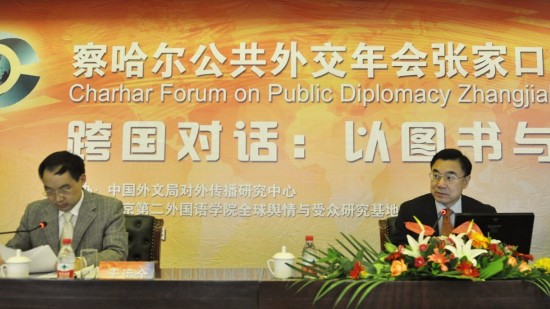Joint China-US publication a boon for diplomacy
 0 Comment(s)
0 Comment(s) Print
Print E-mail By Li Huiru, August 19, 2012
E-mail By Li Huiru, August 19, 2012
|
Yu Yunquan (l.), deputy director of the Center for International Communication Studies, hosts the seminar titled Cross-border Dialogue through Books and Television at the Charchar Forum on Public Diplomacy in Zhangjiakou, Hebei province. The center is engaged in systematic research on international communication theories and practices. [By Li Huiru/China.org.cn] |
A seminar on cross-border dialogue through books and television, part of the two-day Charar Forum on Public diplomacy in Hebei Province, emphasized how cooperation on joint media projects can strengthen bilateral ties.
On the first day of the two-day forum, a seminar titled Cross-border Dialogue through Books and Television drew great attention from experts and scholars attending the Forum.
Co-hosted by the Center for International Communication Studies under China International Publishing Group (CIPG) and the International Public Opinion Research Center under Beijing International Studies University (BISU), the seminar presented with the audiences with four successful cross-cultural communication cases for book publishing and TV production.
Jiang Jialin, the head of the Center for International Communication Studies under CIPG, said she hoped seminar could yield theories and methods to guide the cross-cultural communication in the years ahead and help to push forward China's public diplomacy.
In the first case study, Huang Youyi, member of the Chinese People's Political Consultative Conference (CPPCC) National Committee and vice president of CIPG, shared with the audiences the experiences and lessons learned on the publication of a book series titled The Culture & Civilization of China.
A planned ten-book series, jointly published by CIPG and Yale University Press, will focus on the culture and civilization of China. The deal, the largest cooperative publishing effort between China and the US to-date, is winning a great deal of attention in international publishing circles.
Huang, also the editor-in-chief of China.org.cn, said the project was initiated in early 1990s when a number of factors combined to bring about the first book of the series. He said four factors contributed to the success of the project: support from top officials, an international team of experts, a spirit of inclusiveness, and collaboration between the two sides.
Though the project is a non-governmental effort, many top leaders from both sides lobbied to push the project forward. High-profile supporters include former president George H.W. Bush, former secretary of state Henry Kissinger, and Joseph Verner Reed, undersecretary-general and special adviser to the United Nations. China appointed Rong Yiren, former vice president of the People's Republic of China, as honorary chair on the China side.
Huang noted that scholarly collaboration between the two countries was a key factor in the success of the series. "It involves the hard work of both Chinese and US scholars," he said.
All of the books released under this project are discussed fully and equally by the authorities in sphere of Chinese culture and civilization, which guarantee appeal to readers on both sides. Moreover, through collaborative exchange, US scholars got a chance to gain a closer look at the Chinese cultural relics while the Chinese scholars were able to research Chinese relics stored in the US. Such teamwork helps both sides further elevate the study of Chinese culture, Huang said.






